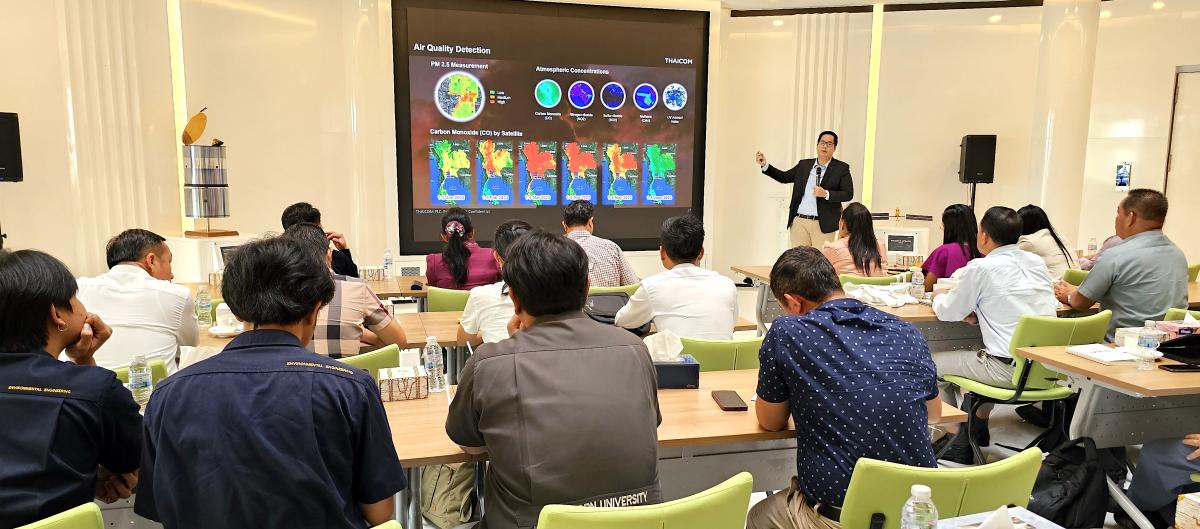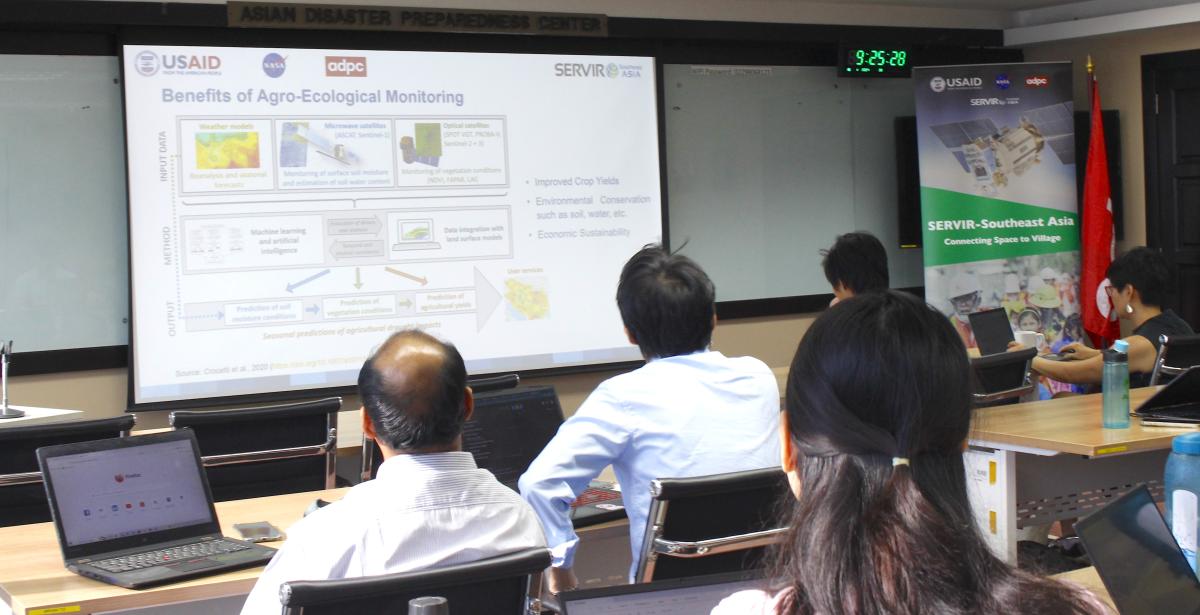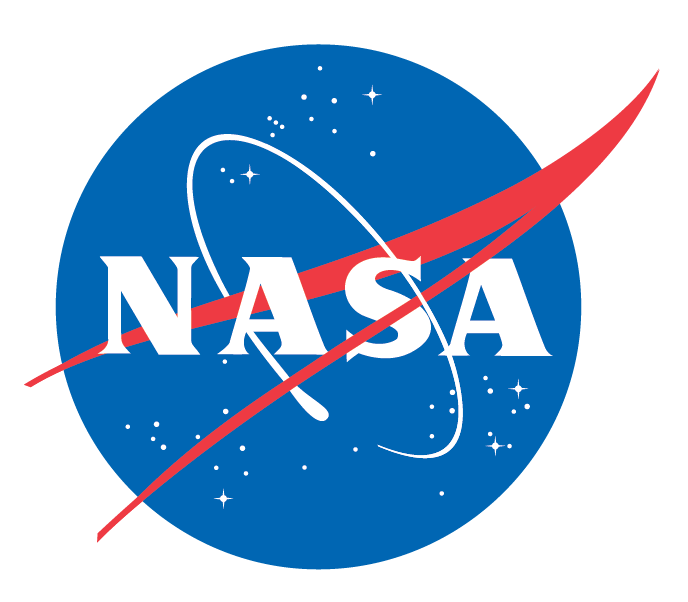Building resilience through capacity-building in Southeast Asia

One of SERVIR Southeast Asia’s (SERVIR SEA) expected outcomes is strengthening and sustaining the capacity of its stakeholders in the region to use data and information for climate related decision-making.
Within the past 18 months of its existence, it has worked strategically toward achieving that mandate through a series of interconnected activities to equip scientists, government officials, community leaders, and young people with skills to use the two-dozen innovative geospatial tools it has in its arsenal to address local and regional environmental challenges.
Launched in January 2023, SERVIR SEA is a joint initiative of the U.S. Agency for International Development, the National Aeronautics and Space Administration (NASA), and the Asian Disaster Preparedness Center (ADPC) — its implementing partner. The program makes use of publicly available satellite imagery and geospatial technologies to address challenges related to climate resilience, agriculture, water security, air quality, and ecosystems in Cambodia, Indonesia, Lao PDR, Myanmar, Philippines, Thailand, and Vietnam.
Since its launch, SERVIR SEA has conducted or facilitated 11 capacity-building events for 365 participants, more than a third of whom have been females.
SERVIR SEA’s capacity-building efforts have been on two interconnected fronts.
First, it has provided workshops for local and regional government officials and technical staff of the national governments and regional organizations for the tools such as the Biophysical Monitoring & Evaluation Dashboard, Regional Land Cover Monitoring System, Mekong Drought & Crop Watch, Air Quality Explorer, and the Protected Area Alerts System.
Such efforts have helped build partnerships and collaboration at regional, national and local levels, thus continuously expanding the impact of its capacity-building activities in the region.
Building on the success of its Mekong Air Quality Explorer tool, SERVIR SEA has provided technical expertise for several regional programs, including the Trilateral Transboundary Air Quality Management project signed between USAID and Thailand International Cooperation Agency (TICA), while making use of the capacity of ADPC and Thailand Pollution Control Department (PCD) to support Lao PDR Ministry of Natural Resources and Environment (Laos MONRE).
Recently, SERVIR SEA organized or facilitated workshops and a study visit for Lao PDR officials to improve their technical capacity and learn from PCD about its strategies, fire management practices, and health information based on air pollution levels. Applying those lessons and the knowledge gained will increase the resiliency of Lao PDR in the face of climate change and transboundary challenges in Southeast Asia. (https://bit.ly/3xLBZqo)

As much of air pollution in Southeast Asia is transboundary and requires regional actions, the workshop provided the participants with hands-on training in building a common framework for receiving, sharing and analyzing information and using decision-support tools. (https://servir.adpc.net/tools).
SERVIR SEA continues to build partnerships and in collaboration with the SilvaCarbon, UN Food and Agriculture Organization (FAO), and the UN Development Programme (UNDP) Cambodia offered Training-of-Trainers (TOT) for the representatives of the General Directorate of Agriculture (GDA) and the Department of Agriculture and Land Resources Management (DALRM) under the Ministry of Agriculture, Forestry, and Fisheries of Cambodia. ADPC experts engaged these representatives over the course of several weeks at ADPC, giving them hands-on exercises to enable them to gain technical skills on using artificial intelligence for crop type mapping at the ADPC.
This collaborative initiative ensures a long-term capacity development because trained representatives of GDA and DALRM transfer their gained technical skills to other departmental staff in their organization.
Another notable regional capacity-building and knowledge sharing activity provided participants from Cambodia, Indonesia, Lao PDR, Myanmar, Nepal, Philippines, Thailand, and Vietnam with hands-on training in using decision-support tools Regional Land Cover Monitoring System (RLCMS) and Se.Plan -- the latter developed by FAO, Spatial Informatics Group, SilvaCarbon, Duke University and Peking University. (https://bit.ly/4cw2gIy)
The second front in SERVIR SEA’s capacity-building strategy has been in working with universities to provide interested individuals with geospatial knowledge and raise their interest in the field and in SERVIR SEA tools and applications.
SERVIR SEA has provided workshops in agroecological monitoring for students from Myanmar at various Thailand universities and educational institutions on the use of geospatial tools such as HYDRAFloods, Mekong Drought & Crop Watch, Regional Land Cover Monitoring System, and Mekong Air Quality Explorer. These workshops showed the participants how to use these tools to improve crop planning and forest landscape management practices in Myanmar, thus contributing to food security.

After workshops, training and study visits, individuals become proficient with geospatial tools and gain confidence in their abilities, which empowers them to take on new challenges and responsibilities. Thus, the impact of SERVIR SEA’s capacity-building activities lay the foundation for a future where Southeast Asian countries confidently use geospatial data and tools to address disaster risks and enhance the resilience of their communities.
For more information:https://servir.adpc.net/tools | https://servir.adpc.net/about/capacity-building



